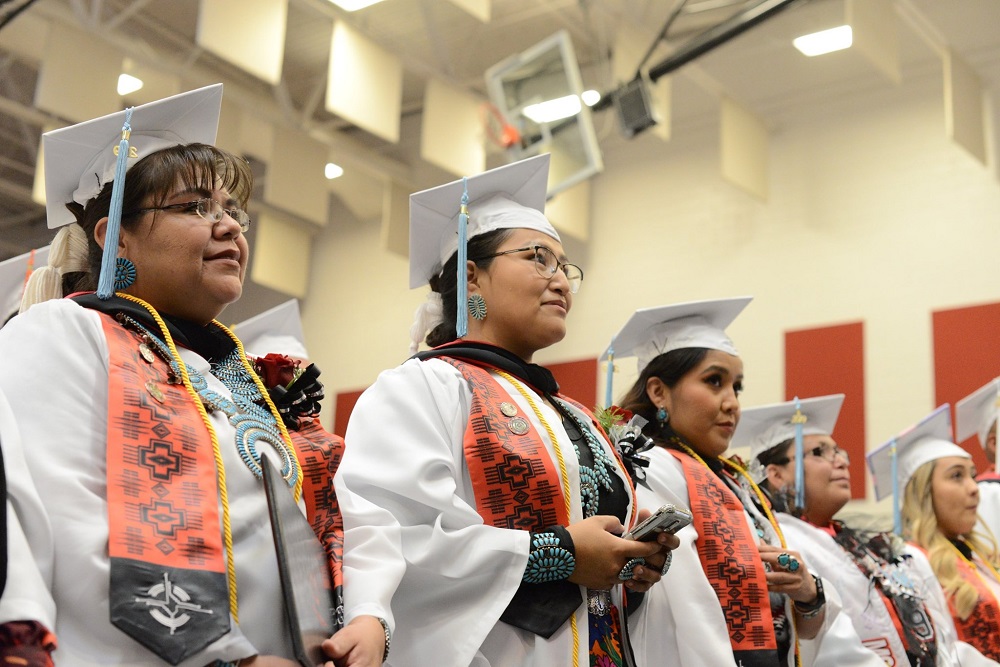
Photo courtesty of Navajo Technical University
Santa Fe, NM – The New Mexico Higher Education Department has outlined educational initiatives in partnership with tribal colleges and communities to benefit members of the state’s Native pueblos, tribes, and nations.
The initiatives are aimed at serving Native students by supporting college readiness, outlining career pathways, expanding opportunities in adult education, and renovating instructional facilities. Over the past two years, the agency has collaborated with New Mexico tribal colleges and communities to serve students by extending the New Mexico Lottery Scholarship benefit to students attending tribal colleges and establishing an Indian Education Division at NMHED. Students attending tribal colleges are also eligible to receive the New Mexico Opportunity Scholarship, established this year to benefit students enrolled in two-year programs.
“Tribal institutions play a critical role in their communities and in the state of New Mexico overall, and we acknowledge and support them as partners in higher education” Acting Higher Education Department Secretary Stephanie Rodriguez said. “We are also mindful of the thousands of Native students all across our state, and are committed to providing them with opportunities to succeed, from cradle to career.”
NMHED will invest $3.4 Million over the next four years to create and sustain a longitudinal data system to monitor student success from birth to career. The data system will help educators and policymakers identify student challenges early on, make targeted interventions and investments, and determine what educational practices and programs drive student success from the early years into the workforce. Other plans include developing career profiles to align Native students with pathways to careers in their home communities.
“The Indian Affairs Department is committed to working with the Higher Education Department in supporting Native students' access to higher education,” said Indian Affairs Department Cabinet Secretary Lynn Trujillo. “We want to ensure that we are helping our students, at all levels, to succeed in meeting their educational goals. NMHED is doing tremendous work to ensure that every New Mexican has the opportunity for a world-class education.”
The agency also spearheaded a research and public service project in partnership with Navajo Technical University to establish an associate degree in nursing program that aims to enroll 24 students each year to provide a career pathway and serve the healthcare needs of Northwestern New Mexico.
“We want to help students to access higher education and return to their communities,” NMHED Director of Indian Education Nathan Moquino said. “We are working on creating pipelines from the secondary level to college and career.”
NMHED has recommended $4.4 Million in state funding via GO Bond C for capital projects in FY22 at New Mexico’s four public tribal colleges. Diné College plans to strengthen the Navajo food system and access to locally-grown foods through renovating the Diné College Farm and the Shiprock Agriculture Multipurpose Center to provide information and resources for area farmers. Navajo Technical University proposes renovations to its Student Services Center and Science and Trades Buildings, the Institute of American Indian Arts plans to upgrade facilities for its Museum Studies program, and Southwestern Indian Polytechnic Institute will invest in infrastructure improvements campus-wide.
The GEAR UP college readiness program will invest $4.5 Million in federal funding annually over the next seven years toward college readiness activities for middle and high school students in low-income areas of the state, including those with large Native student populations in Taos, Newcomb, Bernalillo, and the Española Valley. Activities include tutoring, mentoring, college visits, test preparation, and instructional support. Between 2012 and 2020, the GEAR UP program served 3,000 Native students statewide.
NMHED has also worked to expand access to adult education courses and High School Equivalency testing in remote areas within tribal communities by providing laptop computers to allow for remote instruction and test proctoring. Internet and technology access have challenged rural communities amid the COVID pandemic, especially as adult education programs and testing have moved online. In addition, the New Mexico Higher Education Department will provide vouchers, waving the cost of testing for New Mexico residents wishing to take the HiSET® or GED®, the two approved High School Equivalency tests in New Mexico. Normally, the tests can cost between $50 and $80 for all required subjects. Students can submit a voucher application at https://hed.nm.gov/students-parents/high-school-equivalency/free-hse-testing-voucher-program.
For more information about Indian Education at the New Mexico Higher Education Department, visit https://hed.nm.gov/about/divisions/indigenous-education.
